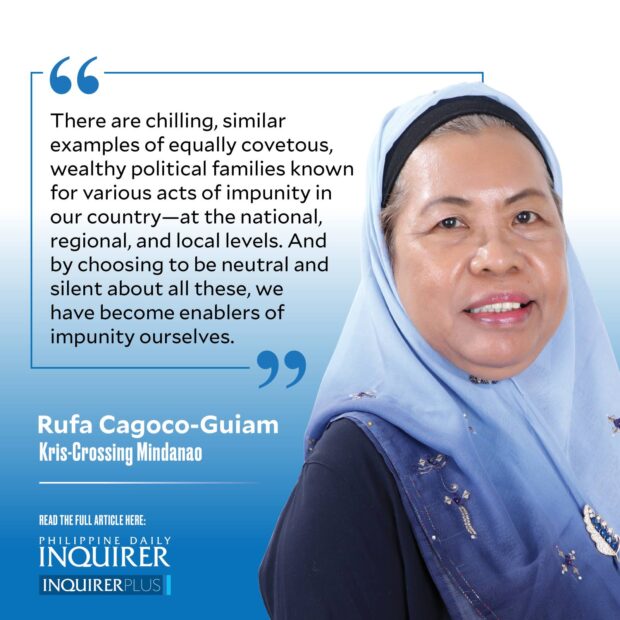Enablers of impunity (3)
Like all other social phenomena, acts of impunity do not occur in a vacuum. A community’s network of social norms, traditions, relationships based on blood, marriage, and even close friendships work in confluence with each other to provide an enabling environment for impunity to thrive.
In addition, social structure (institutions, laws, and policies, among others) can also become incubators of impunity. Those in power are able to shield themselves from being held accountable for anomalies and even crimes they commit because laws and policies can be bent or skirted through the collaboration of government functionaries who are willing supporters of the greed of their bosses as they are equally avaricious themselves. No law implements by itself; it takes a whole social institution of legal and judicial structures, including penology systems to ensure it is made operational and fair to everyone. Implementation of laws needs the cooperation of all members of society to safeguard against the abuses of power of its leaders. Tax paying citizens have the responsibility to call out such excesses and not turn a blind eye to the abuses of their leaders. Bishop Desmond Tutu, a known human rights and justice advocate in South Africa at the time when oppressive apartheid policies governed his country once said, “If you are neutral in situations of injustice, you have chosen the side of the oppressor. If an elephant has its foot on the tail of a mouse, and you say that you are neutral, the mouse will not appreciate your neutrality.”
Article continues after this advertisementMany Filipinos have chosen to be “politically neutral” and not question the huge disparity of treatment between powerful people who are already found to have been guilty of serious transgressions and poor civilians who are allegedly reported to be involved in peddling illegal drugs on the streets. The latter get immediate harsh treatment and were even killed due to allegations that they fought back even if they do not have firearms to do so. As for our rich and powerful officials found guilty of plunder, graft and corruption, and tax evasion—they are not only scot-free, they get elected to their present powerful political positions. And they are even scheming to further enrich themselves, and ensure their perpetuation of power through their children.
I started this series on enablers of impunity with a powerful quote from the great Russian writer and dissident, Alexander Solzhenitsyn: “Evil people always support each other; that is their chief strength.” This quote encapsulates how impunity thrives in a milieu dominated by “evil people” who “support each other,” thereby perpetuating structures and mechanisms like the Gulag system of incarceration in Russia during Stalin’s time. However, no person is inherently evil in Solzhenitsyn’s view. No one was born with wicked horns on their heads and already spewing invectives as soon as they learn to speak. But I believe there are many factors—psychological, social, political, cultural, religious, or belief systems, and even situational, chemical-related—that can shape how individuals think and behave as adults.
This is the case of Alex Murdaugh, who after having been sentenced to two life imprisonments in a court in South Carolina, US, said that he could not bear to hurt his beloved wife and son. To this, the judge who announced the sentence said, “It might not have been you. It might have been the monster you’ve become.” Murdaugh earlier admitted that he had been addicted to opioids for quite some time.
Article continues after this advertisementMurdaugh grew up in an environment that supported his family’s life of power and privilege, including associates and relatives, as well as friends who turned a blind eye to their infractions. For more than 80 years, five generations of Murdaughs were the law and even above the law in their home state; their acts of impunity bolstered by the network of colluding functionaries in different state institutions. There are chilling, similar examples of equally covetous, wealthy political families known for various acts of impunity in our country—at the national, regional, and local levels. And by choosing to be neutral and silent about all these, we have become enablers of impunity ourselves.
Comments to [email protected]
















